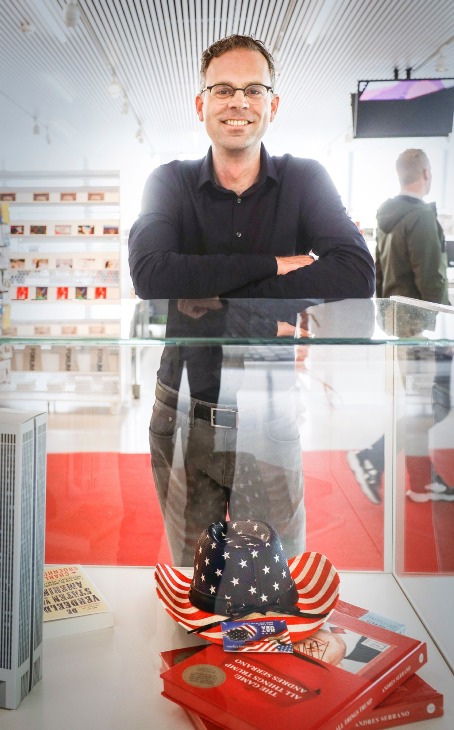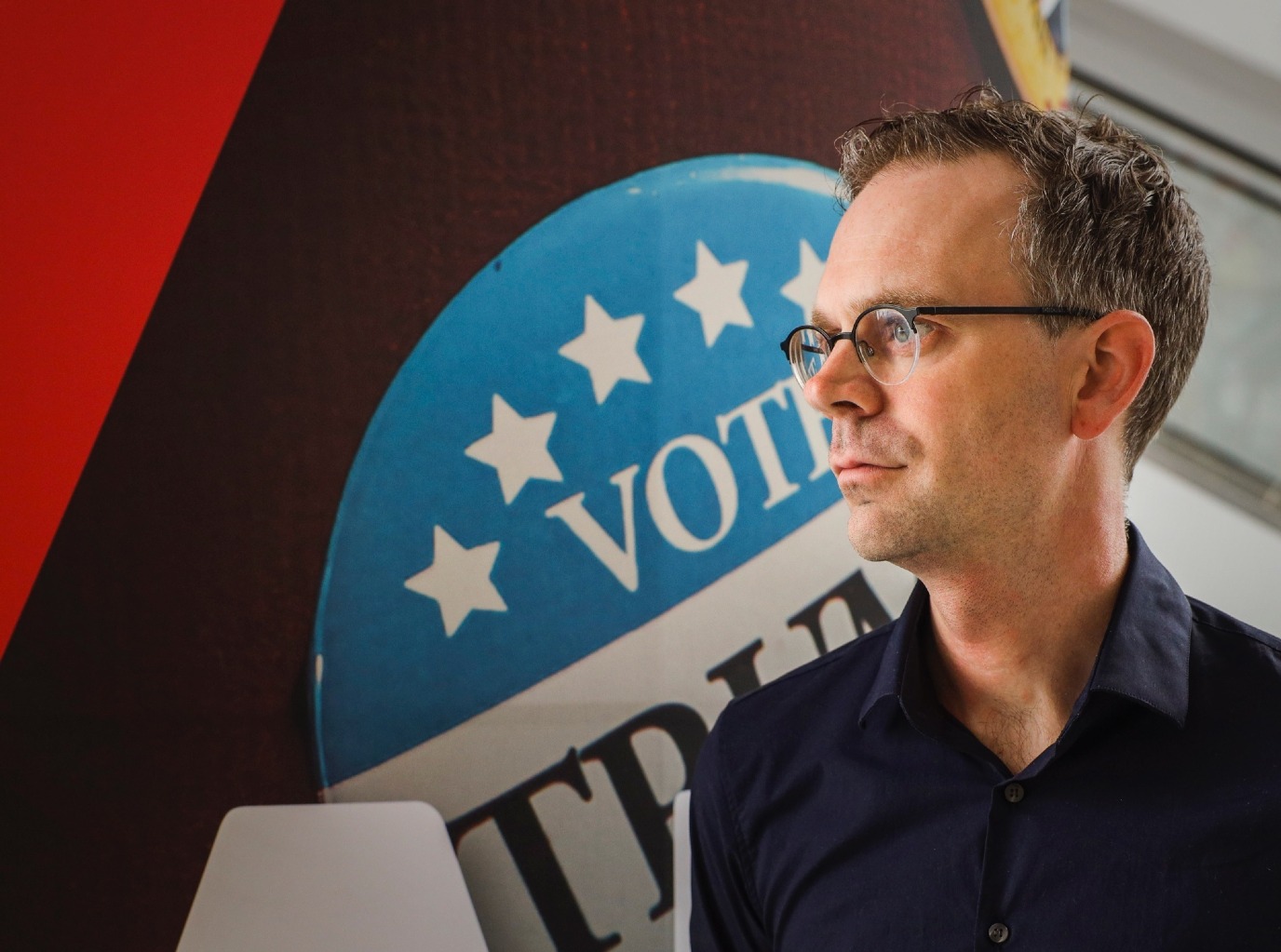Will there be a female American president?

Historian Jelte Olthof is interested in the origins, workings, and influence of the US Constitution. How does the 1787 Constitution function in present-day America? An America that is rapidly changing and where, this year, a female president may be elected for the first time.
Text: Martin Althof, Corporate Communication UG / Photos: Henk Veenstra
E pluribus unum
Olthof emphasizes the appeal that the US Constitution still has: ‘Americans take pride in their Constitution. They love the fact that it succeeded in uniting the different states at the time. ‘E pluribus unum’—out of many, one— is the national motto of the United States, found on all official documents. An atmosphere of sacredness and drama surrounds the Constitution. In the National Archives Building in Washington DC, you can have a look at the US Constitution, in what looks like a temple, with two armed agents as ‘guardians’ of the Constitution. It attracts a lot of visitors every year. In fact, I’ve been there three times myself.’
The Constitution is leading
For Americans, the Constitution is of great significance. Without the Constitution, the United States would not exist. Its symbolic value is far-reaching, and besides, the Constitution broadly describes and stipulates how the political system functions in America, with a president, House of Representatives, Senate, and judiciary. At the same time, a great deal is not covered in it. Olthof: ‘It is a document of only 4,000 words, which dates back to the 18th century. Obviously, you won’t find anything written about abortion, social security, and artificial intelligence. It does touch on piracy... This means that the old texts require interpretation and additions. This happens all the time, with parts of the Constitution being quoted over and over again in discussions. In this context, the Supreme Court, which reviews lower court rulings and legislation against the Constitution, plays a very important role. What would those who drafted the Constitution have thought of it at the time? That question keeps coming up. The Supreme Court makes additional rulings, in which case old texts take on meaning in the present.’

Political rhetoric and elections
On 5 November, there will be elections for the US presidency. The race is between Republican Donald Trump and Democrat Kamala Harris. The campaign is intense and very personal. It used to be different. Olthof: ‘Until well into the 19th century, it was not common for presidential candidates to campaign themselves. Others did that for you—the people who wanted you to be president. Occasionally, you were invited to give a ‘lecture’ somewhere, but that was about it. The shift actually began with presidents Theodore Roosevelt and Woodrow Wilson. They sought to connect with voters. Roosevelt and Wilson bypassed their party and saw that you can also reach the American public directly. As a result, the figure of the president became much more important: a development that can be observed to this day. John F. Kennedy, who made optimal use of the new medium of television, also significantly contributed to this phenomenon. In the 1960 debate with Richard Nixon, he emerged victorious, according to many, thanks to television images.’ Olthof notes that nowadays, parties are almost reduced to one person: ‘Donald Trump has essentially transformed the Republican party into the Trump party. In 2015 and 2016, he still faced opposition; after that, hardly at all. Joe Biden was proving to be a stumbling block for the Democrats. An untenable situation, which led to a change of person. The young, energetic Kamala Harris took over.’

Image and content
Olthof argues that political culture in America has undeniably changed, precisely because of the advent of new technologies—first, television, then the internet and social media. There is a lot of interaction between these media. Image has become much more important. Olthof: ‘Not only does it matter what people say, but also how it is said. Still, not everything is completely fixable. The voters are no fools; they cannot be tricked into believing everything. The impression someone is making has to sufficiently match reality. We are familiar with many rhetorical techniques to get the message across, but it always starts with someone having a message to convey.’ Olthof relates this to Donald Trump, who was able to recognize prevailing discontent and managed to get a lot of people behind him with simple solutions and ringing rhetoric: ‘He revisits earlier times when everything was seemingly better: “Make America Great Again”. In order to solve the current migration problem, he ‘just’ builds a wall. The question is when the time will come when people stop believing him.’
A female president?
Ever since George Washington in 1789, the US president has always been a man. Is that about to change? Is the United States ready for a female president? Olthof: ‘We won’t know until that day has come. As we know, ambitious and assertive women are often unfairly disadvantaged. Men who display these qualities are seen much more positively, as ‘real’ leaders. If women are more modest, they are qualified as passive and lacking in spirit, while men are qualified as wise and thoughtful. For that matter, it turns out that women also judge women this way.’ Olthof finds that things did change since 2016: ‘The warnings of Hillary Clinton and others have come true, just think of the issue of abortion. People are more familiar with Trump now and know what his policies will be; the riots at the US Capitol have left their mark. There are also a number of female role models, such as Nancy Pelosi. To put it briefly, I think the possibility of a female president is closer than it was before.’

Harris and the balance
For Jelte Olthof, the key factor is whether Harris manages to strike the right balance between the content and tone of her message. Olthof: ‘For a long time, the Democrats have mainly focused on saving the political system. They portrayed Trump as a danger to democracy: “Trump is a threat, vote for Harris”.’ But according to Olthof, that strategy falls short. He underlines that Trump has always pushed back against the existing institutions, thereby voicing the feelings of a large part of the American people, who believe that corrupt politics does not benefit ordinary citizens. Olthof understands this: ‘The fact is that Congress has actually accomplished very little, also during Joe Biden’s presidency. Less than one in five Americans think Congress is doing a good job. That is why Kamala Harris needs to present a solid narrative, in which she states that she is really going to change something and also tells us in concrete terms how she is going to do that.” Olthof points out that history shows that this can be done, referencing Franklin D. Roosevelt's New Deal in the 1930s and Lyndon B. Johnson’s Great Society programme in the 1960s. He also believes it will not be easy: ‘Barack Obama was an eloquent politician who tried to seek cooperation with the Republicans during his presidency. They, for their part, however, managed to stall Obama’s agenda. This happened with Obamacare, for instance, partly because of Donald Trump’s opposition. The latter wanted to get rid of the law, partly because it would be an example of unwanted government interference and curtailment of the individual’s freedom of choice, and he did this by invoking the US Constitution...’
More information
More news
-
14 February 2026
Tumor gone, but where are the words?
-
19 January 2026
Digitization can leave disadvantaged citizens in the lurch
